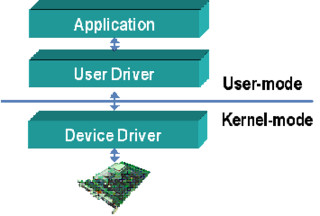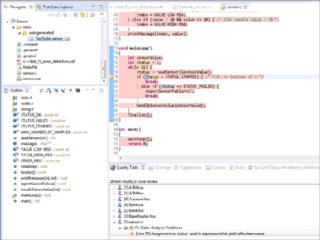In computer science, static program analysis is the analysis of computer programs performed without executing them, in contrast with dynamic program analysis, which is performed on programs during their execution.
Software testing is the act of examining the artifacts and the behavior of the software under test by validation and verification. Software testing can also provide an objective, independent view of the software to allow the business to appreciate and understand the risks of software implementation. Test techniques include, but not necessarily limited to:
In computer science, program analysis is the process of automatically analyzing the behavior of computer programs regarding a property such as correctness, robustness, safety and liveness. Program analysis focuses on two major areas: program optimization and program correctness. The first focuses on improving the program’s performance while reducing the resource usage while the latter focuses on ensuring that the program does what it is supposed to do.
In computer programming, a type system is a logical system comprising a set of rules that assigns a property called a type to every "term". Usually the terms are various constructs of a computer program, such as variables, expressions, functions, or modules. A type system dictates the operations that can be performed on a term. For variables, the type system determines the allowed values of that term. Type systems formalize and enforce the otherwise implicit categories the programmer uses for algebraic data types, data structures, or other components.
In the context of hardware and software systems, formal verification is the act of proving or disproving the correctness of intended algorithms underlying a system with respect to a certain formal specification or property, using formal methods of mathematics.

Simulink is a MATLAB-based graphical programming environment for modeling, simulating and analyzing multidomain dynamical systems. Its primary interface is a graphical block diagramming tool and a customizable set of block libraries. It offers tight integration with the rest of the MATLAB environment and can either drive MATLAB or be scripted from it. Simulink is widely used in automatic control and digital signal processing for multidomain simulation and model-based design.
Software verification is a discipline of software engineering whose goal is to assure that software fully satisfies all the expected requirements.
ESC/Java, the "Extended Static Checker for Java," is a programming tool that attempts to find common run-time errors in Java programs at compile time. The underlying approach used in ESC/Java is referred to as extended static checking, which is a collective name referring to a range of techniques for statically checking the correctness of various program constraints. For example, that an integer variable is greater-than-zero, or lies between the bounds of an array. This technique was pioneered in ESC/Java and can be thought of as an extended form of type checking. Extended static checking usually involves the use of an automated theorem prover and, in ESC/Java, the Simplify theorem prover was used.
In the context of software engineering, software quality refers to two related but distinct notions:
Java Pathfinder (JPF) is a system to verify executable Java bytecode programs. JPF was developed at the NASA Ames Research Center and open sourced in 2005. The acronym JPF is not to be confused with the unrelated Java Plugin Framework project.
Dynamic program analysis is the analysis of computer software that is performed by executing programs on a real or virtual processor. For dynamic program analysis to be effective, the target program must be executed with sufficient test inputs to cover almost all possible outputs. Use of software testing measures such as code coverage helps increase the chance that an adequate slice of the program's set of possible behaviors has been observed. Also, care must be taken to minimize the effect that instrumentation has on the execution of the target program. Dynamic analysis is in contrast to static program analysis. Unit tests, integration tests, system tests and acceptance tests use dynamic testing.
LDRA Testbed provides the core static and dynamic analysis engines for both host and embedded software. LDRA Testbed is made by Liverpool Data Research Associates (LDRA). LDRA Testbed provides the means to enforce compliance with coding standards such as MISRA, JSF++ AV, CERT C, CWE and provides visibility of software flaws that might typically pass through the standard build and test process to become latent problems. In addition, test effectiveness feedback is provided through structural coverage analysis reporting facilities, which support the requirements of the DO-178B standard up to and including Level-A.
Cppcheck is a static code analysis tool for the C and C++ programming languages. It is a versatile tool that can check non-standard code. The creator and lead developer is Daniel Marjamäki.

Device drivers are programs which allow software or higher-level computer programs to interact with a hardware device. These software components act as a link between the devices and the operating systems, communicating with each of these systems and executing commands. They provide an abstraction layer for the software above and also mediate the communication between the operating system kernel and the devices below.

Parasoft C/C++test is an integrated set of tools for testing C and C++ source code that software developers use to analyze, test, find defects, and measure the quality and security of their applications. It supports software development practices that are part of development testing, including static code analysis, dynamic code analysis, unit test case generation and execution, code coverage analysis, regression testing, runtime error detection, requirements traceability, and code review. It's a commercial tool that supports operation on Linux, Windows, and Solaris platforms as well as support for on-target embedded testing and cross compilers.
ECLAIR is a commercial static code analysis tool developed by BUGSENG, LLC for automatic analysis, verification, testing and transformation of C and C++ programs.
KPI driven code analysis is a method of analyzing software source code and source code related IT systems to gain insight into business critical aspects of the development of a software system such as team-performance, time-to-market, risk-management, failure-prediction and much more.
In computer science, language-based security (LBS) is a set of techniques that may be used to strengthen the security of applications on a high level by using the properties of programming languages. LBS is considered to enforce computer security on an application-level, making it possible to prevent vulnerabilities which traditional operating system security is unable to handle.
Infer, sometimes referred to as "Facebook Infer", is a static code analysis tool developed by an engineering team at Facebook along with open-source contributors. It provides support for Java, C, C++, and Objective-C, and is deployed at Facebook in the analysis of its Android and iOS apps.


